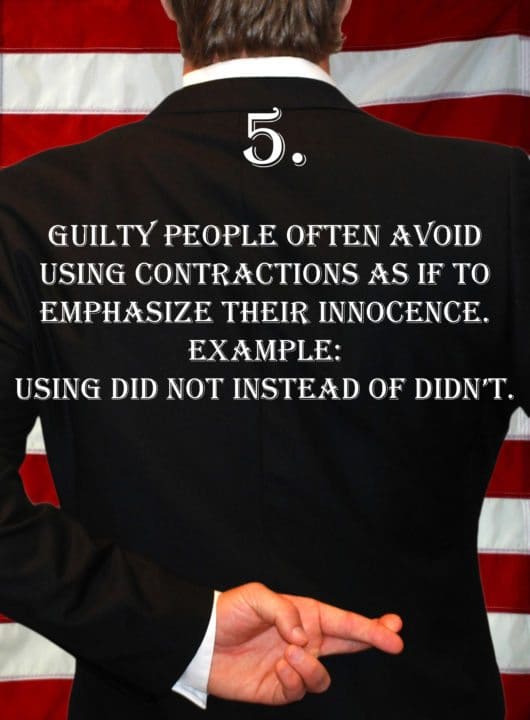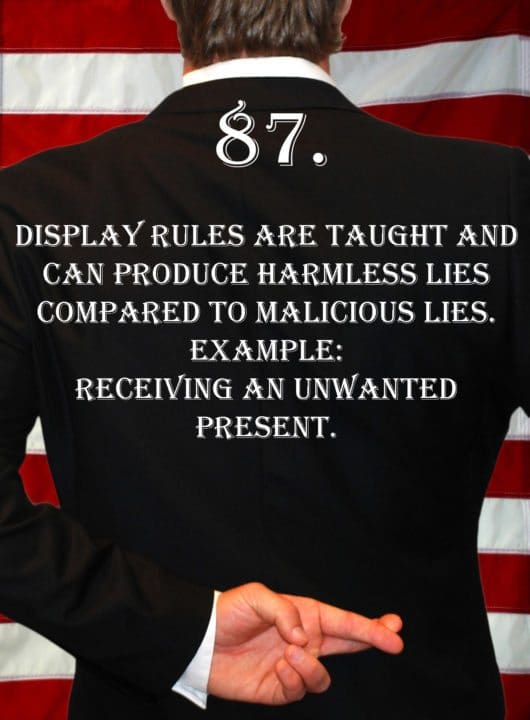
Deception Tip 5:
Guilty people often avoid using contractions as if to emphasize their innocence.
Example: using did not instead of didn’t.
Listen To The Podcast!
E5 – Contractions – Deception Tips Podcast – Click Here To Subscribe
Podcast Transcript
Hello, and welcome to the Deception Tips Podcast, where you will learn amazing cues to detect deceit that will help you read people like never before. I’m your host, Spencer Coffman. Let’s get started.
Welcome to episode 5 of the Deception Tips Podcast. Last time, we went over a behavioral sign that is very easy to spot. In addition, when you see it, you can be almost sure, there is some form of deception going on.
This sign occurs when someone is performing a physical task and then, when that person is questioned or doubted in any way, or is asked to tell more of their story, they stop doing whatever they are doing to tell the lie. This is because a lie is a conscious effort. They have to think about it. They have to plan for it. They have to prepare it.
Lies are very stressful for the physiological responses of the human body. When someone is doing some form of simple task, that task is usually an unconscious task. It’s something that they do often enough, so often that it becomes a habit. It’s a form of habit for them.
Therefore, when they recite this rehearsed lie, the lie that they had to think about consciously, their unconscious stops doing that unconscious task because, as we’ve talked about before, the unconscious is very, very truthful. So when the conscious tries to sneak out a rehearsed lie, and the unconscious is busy doing some unconscious task, it stops because it’s trying to catch the conscious’ lie. It wants to leak some form of nonverbal behavior.
What’s ironic though is the fact that the unconscious stopped performing a certain task is a form of leakage in and of itself. So remember that when people are doing those tasks and you question them if they stop working that is a red flag for you.
However, there is an exception. Some people are unable to talk and work at the same time or work and talk. You’ve heard that saying, some people aren’t able to walk and chew gum, they can’t even walk and chew gum at the same time.
Those people who cannot talk and work at the same time. They’re going to stop no matter what. It doesn’t matter if they’re telling the truth or telling a lie. They’re going to stop doing whatever task when they respond. So for them, it would be the opposite.
They would probably keep working through their lie because that is something that they’re just going to keep on doing in an effort to tell the like. Doing that work, it’s stressful, they kind of forgot about it.
So the point here is that it is a deviation from normal behavior. You need to establish baselines in any case and with anybody, and if they deviate from that normal pattern then you have a good basis to understand that that is probably a lie. And in that case, you need to prod, use further questioning, and watch for additional signs of behavior because there will ALWAYS be more than one sign.
Today we are going to talk about a different sign of deception that is a verbal sign. It is something that will occur when people are talking. It is a form of speech or a different pattern of speech. It’s a subtle form of leakage. One that you most likely don’t notice.
However, once you’re made aware of it, it will stand out like a neon light. You begin to hear it happen in conversation all around you and you’ll start to wonder whether or not all of those people are lying or whether it’s simply happening in the conversation.
With that, here is Deception Tip 5: Guilty people often avoid using contractions, as if to emphasize their innocence. For example, using “did not” instead of “didn’t.” Here it is again- Guilty people often avoid using contractions, as if to emphasize their innocence. For example, using “did not” instead of “didn’t.”
The reason this happens is that when people lie, they not only need to convince the target that the lie is true, but they are also working hard to convince themselves. The conscious is trying so hard to convince itself that the lie is true so that it can get it past the unconscious because if the person believes it’s true, then the unconscious will let the guard down and those signs of leakage may not show up.
This happens all the time with people who are considered sociopathic or psychopathic individuals. They believe what they say all the time and they seem to talk with a silver tongue. People will always believe them, they look so believable, they’re very confident, and they never show any signs of leakage. This is because they BELIEVE their lies. And that is a big red flag for anyone. If you start believing your lie, you know there’s a problem.
In addition, it’s very difficult to read those people because they don’t display any signs of deception. So for them, everything you’re learning here is pretty much out the window. The main thing to look for in those types of people is a deviation from normal behavior.
And whatever their normal behavior is, you need to find something that deviates from that in order to tell whether or not they are lying. The good thing for you is, that there aren’t many of those people out there that are that pathological or that, let’s say, sick because they are sick. They are sick in the mind. They need some form of treatment. There is something wrong with them- a screw loose, as you would say.
Many people are borderline there, or they’re not quite sick yet. They’re unhealthy. Those people will display the signs. 90% of the people out there, you will be able to see this on, you’ll be able to see all the signs on if you look for them.
When it comes to speech patterns, we typically talk using the path of least resistance. This means we say things fast, often times we don’t enunciate enough. In addition, we tend to slur our words together to try to make it easier for us to get our message across and communicate with people.
This is why when you learn another language it always sounds like they’re talking so fast like you can’t understand them. But it’s the same for them when they try to learn our language. We talk fast. It’s human nature. We speak with, like I said, the path of least resistance. “I don’t know” becomes “I dunno” and “thank you” becomes “thanks.”
We shorten things. We make it efficient for us to use. We’re always abbreviating, we’re always using things like contractions. We say “don’t,” “couldn’t,” “wouldn’t,” and “shouldn’t.” This is because we want to get our message out as quickly and as easily as possible.
Most of the time it’s because people like to talk and if they shorten things up, they can say even more. This is interesting because, in our everyday conversations, we’re trying to get our message out as fast as we can.
When we lie, we’re under an immense amount of stress and our body is under stress and our mind. There is a lot of anxiety and pressure. Usually, liars try to get the lie out as fast as they can. And this happens all the time. In many of the other behavioral signs, liars try to get lies out as fast as they can.
So this is interesting that liars tend not to use contractions because you would think that a contraction would help them with their lie. The reason they don’t use them is that the unconscious puts that in there as a sign of leakage.
It’s almost as if there are two separate entities battling each other and they’re actually entities. Like two different people when, in fact, they’re one being of the same person. The unconscious knows that, typically, we try to talk and we use contractions. So it splits up a contraction when the conscious is trying to tell a lie.
You’ve heard this before- “I didn’t do it.” “I did not do it.” We’ve had a few famous presidents say things like that. “I am not a crook.” We’ll get a soundbite in here. “I am not a crook. I have burned everything I’ve got.” “I am not a crook.” You see he should have said, “I’m not a crook.”
In addition, how about Willie? “I did not have?” You know the saying. “ I did not have sexual relations with that woman.” There are a lot of people who, when they lie, they put emphasis on the words that are hopefully going to prove their innocence.
“I DID NOT.” That’s a statement of innocence. That is why they tend to split up the contractions because they think that it’s going to put more emphasis on the fact that they are innocent. They did NOT do it. But what they don’t know is if they just say “I didn’t do it,”
It sounds a lot more believable. It sounds a lot more natural. Because we use contractions in everyday speech, when we don’t use them, it sounds a little different. It’s a little odd. And now that you realize this and notice it, now that I’ve told you, you’re going to start noticing these everywhere. I’ve got a few more examples for you as well as some of the rationale behind this coming up after this.
Have you ever gone to purchase a vehicle or appliance and weren’t really sure if the salesman was telling the truth? Now there’s a book that will help you spot the telltale signs of lying. It’s Spencer Coffman’s A Guide to Deception. Grab your copy today on spencercoffman.com or any major retailer.
Listen to this sentence. “I didn’t steal your car.” Notice how it simply flowed off the tongue. It was easy to say. It was easy for you to hear. You didn’t think anything of it, nor should you because it’s the truth. It sounded true because it sounded natural. “I didn’t steal your car.” You still have your car hopefully. No one has stolen it. It wasn’t me. It sounded natural. I was confident in saying it. That’s all there is to it.
Now listen to this sentence. “ I did not steal your car.” Notice how it sounded a little bit staccato-like. It was broken up. “I did not steal your car.” Why did he say that extra not? What was up with the emphasis?
It should have been “I didn’t steal your car,” and now you say “I did not steal your car.” There’s a lot of emphasis on that word and that’s just how it came off the tongue. I didn’t even stress those words. But because it’s there with the “not” and the “did not” they sound off because we don’t speak like that. You clearly heard the words “did” and “not.” They were the main focus of the sentence.
It sounds like this because it’s completely unnatural. It isn’t as easy to say “did not” as it is to say “didn’t.” “Didn’t” comes off the tongue, it’s easy to say, so are all contractions. Contractions are easy to say. Whereas when they split up, it’s more work for them to say it. This is very interesting, as we said before because liars try to get it out as fast as they can.
They want to tell their lie. That’s what they’ve planned for, they’ve prepared for. Or they’re just telling it spontaneously as a form of protection. They want to convince the target and they want to convince themselves. This is why they split up a contraction.
By avoiding the use of contractions, they are adding additional emphasis and stress to those words. They’re hammering home their point. Their confession of innocence in their mind. They’re consciously reinforcing the statement of the lie.
The conscious thinks it has everything figured out. In reality, it has no clue what is going on. After all, the unconscious dominates over 90% of our actions and behavior. A lot of figures say that it’s 70%. It’s a lot more. Think of all the things that you think about. It’s 70% in conversation, but you think about a lot of things in your mind, unconsciously and consciously.
Our body and our world are ruled by our unconscious. Think about this. You don’t have to consciously think to breathe, walk, move, hear, beat your heart, swallow, etcetera. All this stuff happens involuntarily. Unconsciously. That alone should prove that the conscious cannot be trusted 100% of the time. When it tries to lie, the unconscious always knows better.
The unconscious of the listener knows better as well. So the target here is this unnatural speech that the unconscious mind of the liar slipped in there. And something’s off in the target’s mind. They’re saying “What’s going on? Something just doesn’t sound quite right.”
The target hears that and, at first, they might not think anything of it. But now that you know, realize, and understand what it means, it will stand out to you instantly. It’ll stand out like a sore thumb.
Of course, if you start hearing the lack of contractions, you need to remember that it isn’t a sure thing that someone is lying. He or she may be telling the truth. They may simply talk in a manner of not using contractions because maybe they were an essay writer and they needed to use more words. And by splitting up each contraction they got two words instead of one. So they developed a natural habit of writing that way. You never know.
There could be any form of explanation or circumstance. This is why it is important to look for patterns and clusters of behavior because there will ALWAYS be more than one sign.
So stay vigilant and use the signs we’ve already gone over and you’ve already learned as entry points for further questioning to see if there are any other signs of deception. There will always be more than one sign.
I want to thank you for listening to this podcast and I encourage you to share it with your friends, subscribe to the feed, follow the Deception Tips blog, take a look at the books I have available, and, as always, tune in for a new Deception Tip.
Video Transcript
Hey guys, my name is Spencer Coffman. Thank you for tuning in to the Deception Tips Videos. They’re all about teaching you how to read people that detect deception so that you will know if someone is lying to you.
Today we are going to talk about a cool thing, and it’s a verbal sign of deception that is something that happens all the time. It is probably one of the most prevalent signs out there and it happens all the time, but you may not notice it happens. So this is one called contractions. It’s something that we speak with in everyday language. We love to use them and when we don’t use them, it could be a sign of deception.
So here it is Deception Tip Number 5: Guilty people often avoid using contractions as if to emphasize their innocence. Example: Using did not instead of didn’t.
“I did not do it.” “I didn’t do it.” You see there is a stark, and profound difference. “I did not do it”, “I didn’t do it.” Which one sounds more authoritative and more, has more emphasis behind it? It’s obviously the “I did not do it”. Because I’m stressing those extra syllables. I’m saying “Did not do it”. That is something that we don’t normally speak with. In normal conversation, humans are very, you can call it lazy or you can call it efficient, whichever you choose. Humans are one or the other. It’s both, really. We like to speak as quickly as possible. We like to get our point across, most of us anyway, like to get our point across as quickly as possible with the least amount of effort possible.
So if I am gonna use language and talk, I’m gonna use contractions. You noticed right there, I said, “I’m gonna”. Well, “gonna” is not really a word in the English language. It’s kind of slang. Instead, you would say “going to”. But, that’s not efficient. I slur them together to make it more efficient, just like I’d say, “I didn’t do that”, or “I’m not going to do that”, or “I’m”, or “you’re”. We put words together to speed up the process and make it a little quicker.
Therefore, when someone doesn’t do that, it sounds a little abnormal. And now that you know of this, now that I’m pointing this out, you’re going to start to notice it a lot. You’re going to hear people say: “I am going to the store today”, or “I did not do that”, or “I will not do that”, instead of won’t, or “didn’t”, or “I’m”. Things like that. You’re going to start to notice that they’re going to stand out like red flags in your mind and you will wonder whether or not that person is really telling the truth. And the reason that this happens is because the conscious wants to get that lie out as quick as possible.
So you would think that if the conscious wants that lie to come out really quickly, it would use contractions. Because then that would be less words it would have to say, it would come out a lot faster, be more efficient, which is the case. However, the unconscious wants that liar to be caught. They want the truth to come out. I speak of it like it’s two separate things, but really it’s the same. It’s two entities within your brain, conscious and unconscious, they’re always fighting.
So the unconscious is the one that separates that contraction to make it more noticeable so that the liar can be caught in that lie. By saying “I did not do it”, that is separating a contraction, it’s putting more emphasis on that so that in a way, it kind of satisfies the conscious as well because now the conscious says, “boy I really put some emphasis on that lie, I really convinced them.” And the unconscious says, “good, I got it. I split apart a contraction, which is normal, and I made it sound abnormal.”
So pay attention to the use of contractions in everyday language and always keep in mind that people could break apart contractions for any reason. Maybe, for example, in writing. Kids who have to write a 500-word essay, they were, they’re going to separate every single contraction, because they don’t want to hit, you know, they want to get 500 words as fast as possible, and by saying “I am”, and “did not”, that’s two words instead of one. So if you’re reading it, that’s a whole different story. And, in addition, when people talk, they may split apart contractions as a form of habit. Maybe it’s part of their grammar, maybe they really are think that they’re high society and want to portray that they’re really well educated, and so they split apart everything and try to talk proper.
But there are a variety of different reasons that it could happen if you pay attention to it and you’re aware of it when it happens, then you can look for additional signs. Because there will always be more than one sign. You’ll start to see patterns and clusters of behavior and then you can be certain that someone is lying to you.
So if this is your first time watching this channel, I would love to have you subscribe to it on YouTube. In addition, if you have any questions or comments, feel free to leave ’em there as well.
Also, if you’d like more information on any of this, we have books, podcasts, blog posts, all available on SpencerCoffman.com That are all dedicated to teaching you exactly what every body is saying.
Until next time.






